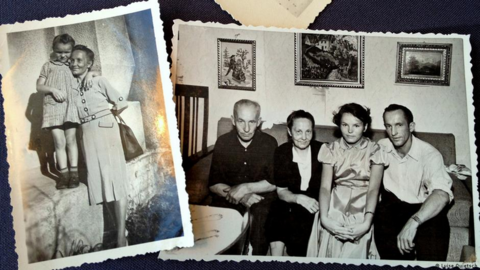After the Red Army came to East Prussia in 1945, thousands of German children were left on their own, their parents having been killed or displaced. Older children often tried to keep their siblings together, and searching for food and shelter became their number one priority. Some of them were left to roam through unforgiving forests in order to survive. The children, most of them between four and twelve years of age, stumbled through forests, alone or in groups; their bellies were bloated, their arms and legs as thin as twigs, their teeth beginning to rot, some of them without shoes. They ate grass, frogs, whatever they could find – and often, simply nothing. Many went on the search for food into neighbouring Lithuania. There, they sometimes had to work hard for little food, but some of them were adopted by Lithuanian farmers, who often also employed them.
Alfreda (in the photos), born Luise Quietsch in the German town of Schwesternhof in East Prussia in 1940 (today in the Russian region of Kaliningrad), was adopted at the age of four by a Lithuanian family. Initially, Luise, together with her aunt and cousin, fled westward. She had seen burned trees, the cadavers of horses, abandoned half-opened suitcases (she remembers wanting to take the teddy bear from one). After the bombing, she got separated from her aunt. Eventually, she was saved by a Russian Red Army cook and taken to the authorities. Her new family organized Lithuanian papers for her and sent her to school. With help from the Red Cross, she even managed to find her siblings 48 years after the separation.
Since 2008, Lithuania provides a small pension for the “wolf children” (around 50 euros) but only if they can prove that they were born in East Prussia.
